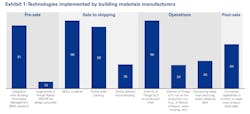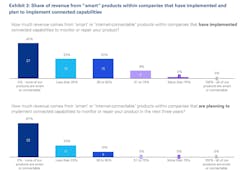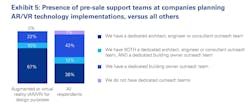4 insights on building product manufacturers getting ‘smart’
KPMG, an organization of firms that provide audit, tax and advisory services, surveyed 100 U.S. building material manufacturing executives to understand what technological investments they had made—or were planning to make—and why.
These digital developments range from Building Information Management (BIM) integration to e-commerce and online delivery. Regardless of the method, KPMG pulled out four surprising insights from the results of the survey.
Overall, half of building product manufacturers plan to invest in one or more areas of technology in the next three years. The survey breaks down technology categories by product journey, from pre-sale, sale to shipping, operations, and post-sale groups. Pre-sale technology would include BIM systems and AR/VR design, for example.
1. Connected capabilities can work without ‘smart’ products
In the study, KPMG expected to see post-sale connected capabilities to only be applicable to smart products, such as thermostats, security systems, and air conditioners. However, 42% of respondents that have already implemented such connected capabilities have no products with any smart features.
Likewise, 67% of respondents who plan to implement these technologies in the next three years said the same.
2. Technology can drive both revenue and cost benefits
What are the largest influences behind implementing new technologies? Over half (56%) of building materials manufacturers report cost savings as one of the biggest reasons. Forty-two percent attribute their influence towards the labor/talent shortage, while 75% of manufacturers planning to implement new technologies do so for a competitive advantage.
Alternatively, one-quarter (26%) of respondents listed ESG concerns as an influence, and just 22% said that customers were requesting it. KPMG finds that the reasons did not differ significantly across company types or types of technology.
3. AR/VR technology is in addition to—not a replacement for—outreach teams
Rather than displacing the role of sales support teams, AR/VR tech was found to be an additional tool for architects, engineers, and consultant outreach teams. The survey shows that 78% of companies investing in AR/VR and remote monitoring to help the pre-sale process have a dedicated support team.
This is above the general average of 50% of respondents with the same teams, but without AR/VR technology in place, according to the report.
4. Companies overestimate their technological sophistication levels
When asked about their companies’ technological maturity compared to competitors, a majority of respondents (70%) believe they are more advanced than average. Only 9% believe their company is below average, but no respondents claimed to be “the least advanced of all our competitors in digital maturity.”
Furthermore, KPMG saw that the more technologies a company selected as “implemented,” the more likely they were to self-rate as being above average or best-in-class.
“While quantity certainly helps, quality of execution is a determining factor in how effective these technologies are,” says Serena Crivellaro and Len Prokopets, Managing Directors, Advisory, KPMG. “Unfortunately, with technological deployments being so broad-based across the industry, competitors may be more advanced than companies expect.”
Click here to view the entire report.





